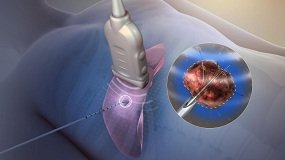

Radiofrequency ablation (RFA) is a minimally invasive procedure which includes treatment of part of the electrical conduction system of the heart, tumor or other dysfunctional tissue is using the heat generated through the electric current produced by a radio wave. The heat destroys the nerve fibers carrying pain signals to the brain. It can provide relief for people suffering from chronic pain mainly in the lower back, neck, arthritic joints and even cancer.
Radiofrequency, as well as microwave ablation procedures, are effective treatment options for people who have difficulty with surgery or those who have tumors with a diameter of less than one and a half inches. The procedure uses heat to interrupt pain signals in spinal nerves. This efficacy of RFA is to treat chronic low back pain associated with lumbar facet joints, sacroiliac joints, low back pain, and the coccyx. Besides, RFA treatment is advisable for patients having varicose veins problem and venous insufficiency. Radiofrequency ablation can also treat cardiac arrhythmia and obstructive sleep apnea(OSA) along with bone, lung, liver and kidney tumors. The treatment uses image guidance to place a needle into a live tumor. High-frequency electric currents pass through an electrode in the needle creating a region of heat. Ablation can be used to treat more than one tumor at the same time.
Like any other medical procedure, there are certain risks involved in RFA which are listed as under:
● Leg numbness: As an impact of local anesthesia, you might feel numbness in the leg which lasts for a few hours.
● Discomfort in the back: This may occur once the local anesthesia wears off and usually lasts for a few hours. In case the discomfort persists, apply ice on the procedure day and moist heat the day after the procedure. In extreme cases, switch to pain relievers.
● Paralysis: In rare cases, temporary or long-term paralysis can occur if too much electric current is passed on the nerves which run into the spinal cord.
● Improper placement of a needle or incorrect use of electric current may cause weakness in muscles.
● You may experience burning and hypersensitivity over the injection site.
● Swelling and bruising occur at the incision site.
● Since the skin is punctured, infection around the injection site may be possible.
● Bleeding can occur inside the body.
● There is a possibility of occurrence of motor deficits as they are related to nerve damage which occurs during the procedure. Physical therapy may help recover from the damage caused.
● An allergic reaction to sedatives or other medications can be dangerous.
After the procedure, you may experience a few days of discomfort around the incision site. The following points are advisable to achieve faster recovery:
● Allow your body to rest at least for a couple of days following RFA.
● Your doctor may prescribe anti-inflammatory medications to ease pain and swelling.
● Cold compresses can also offer relief at the incision site.
● Avoid taking a shower for two to three days after the procedure.
● Avoid strenuous lifting or operating heavy machinery for a few days.